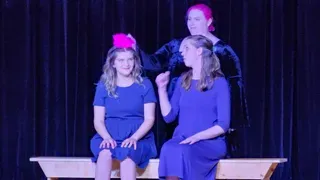June 29, 2013
San Francisco Gay Men's Chorus: Harvey Milk 2013
Roger Brigham READ TIME: 3 MIN.
It was 35 years ago that Harvey Milk's assassination in a political double-homicide at San Francisco City Hall sent shock waves of anger and despair rocketing through gay ranks the world over. But as a new musical tribute to the slain gay rights pioneer made its world premiere this week just a couple of blocks from where Milk lost his life, his ability to inspire has ensured that the grief after his loss was followed by hope -- and those willing to chase hope.
"Harvey Milk 2013" is a pair of song cycles commemorating the man and the legacy that constitute the Harvey Milk story. The first cycle, "I Am the Legacy," includes half a dozen songs composed by contributors who had responded to a call from the San Francisco Gay Men's Chorus for submissions of original artistic works about Milk.
It was preceded by a video presentation bridging some of Milk's speeches right up to the Supreme Court decisions on same-sex marriage the day before, including the boisterous celebrations in the Castro, the gay-ghetto neighborhood in which Milk launched his political career.
Of the songs, the most haunting is the penultimate tune "Altoona, Pennsylvania," written and performed by Julian Hornik, and drawing on one of the iconic letters Milk quoted in his speeches about the importance that happened in the streets of San Francisco had for those living in rural repression. The cycle concludes with "Give 'em Hope," composed by Joseph M. Martin and lyrics by Pamela Stewart, which evokes the signature catchphrases of Milk's career.
The second song cycle is "I Am Harvey Milk," a dozen pieces commissioned by and performed with the chorus, composed by Andrew Lippa, who sang the role of adult Milk. Lippa, with soprano soloist Laura Benanti and Noah Marlowe as young Milk, accompanied by the Bay Area Rainbow Symphony, explores distinct moments and moods from throughout Milk's life.
To capture the senselessness of Milk's slaughter, Lippa gives us not the assassin, former SF Supervisor Dan White, but the bullet itself: unthinking, driven not by its own free will but by the irrational fear and loathing of others. We go from young Harvey singing the soprano aria from "La Boheme" to the late-in-life Milk who overcame his doubts to become the assertive leader in "Tired of the Silence."
But the piece that has the best chance of catching on, if the chorus ever decides to do a disco remix of it, was the song that captured the rakish, playful side of Milk. "Friday Night in The Castro" is a wonderful nod to Donna Summer (think "Last Dance") and the pre-AIDS disco dance years spent wiling the night hours away.
Organizers say ticket demand was so high that late in the game they added a pre-premier performance for Wednesday, June 26 -- the day the Supreme Court rulings came down. But the big event to be at was the official premiere the following night. Prop 8 plaintiffs Kristen Perry and Sandra Stier were in the audience; Milk's friend Cleve Jones, founder of the AIDS quilt project, introduced Lippa's work to a packed Nourse Theatre house.
And the theatre itself was a major star of the night, with semi-mixed reviews. It is a magnificent looking facility, formerly a top-notch high school auditorium, which sat empty since closing in the 1950s. It's been refurbished to fill in for performances while the Herbst Theater undergoes a facelift.
Internal acoustics? Great. Street noise? Horrendous; sirens passing through the Civic Center neighborhood provide distracting punctuation to performances. There was no solo light on the signer so it was hard to read the sign language translations in the darkened theatre, the video projects of text of Milk's words in the pre-program segment were hard to read from the upper seats and the sound system was occasionally muffled making it difficult to understand the voices at time.
But those are bugs that surely will be ironed out as the Nourse gets its legs back under it. In the meantime, we have the memory of Milk and now, the music to hum it to -- performed so eloquently by the choral group that got its birth that dark night in 1978 when gay men gathered in the steps of City Hall, the civic building that has once seemed so remote, then held such promise, and now was the battleground on which our inspirational leader had fallen.
So now we'll do what Harvey the Man rather than Harvey the Politician would do.
Party in the Castro. Sing it, Donna.
Roger Brigham, a freelance writer and communications consultant, is the San Francisco Editor of EDGE. He lives in Oakland with his husband, Eduardo.





